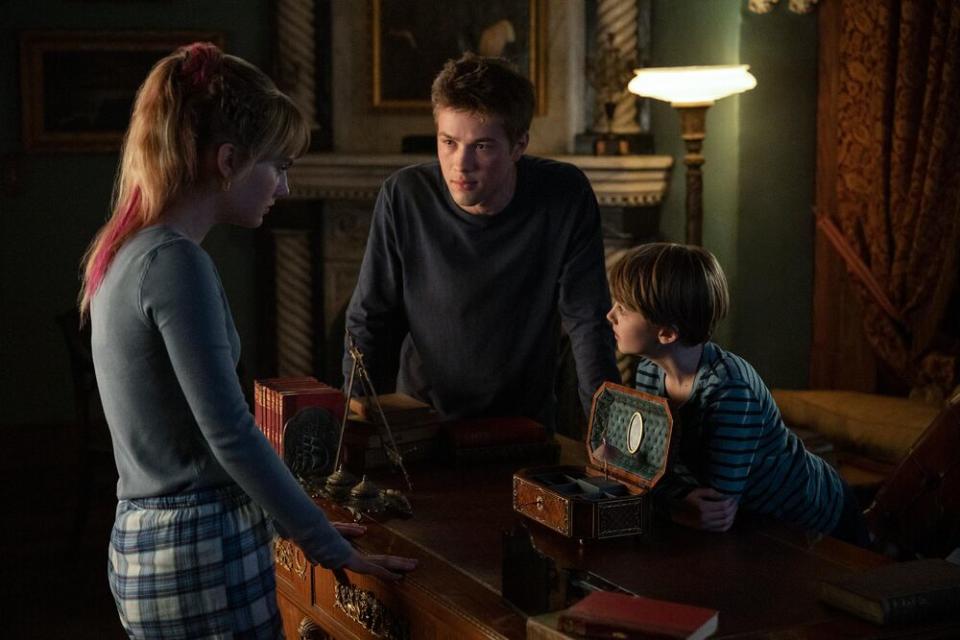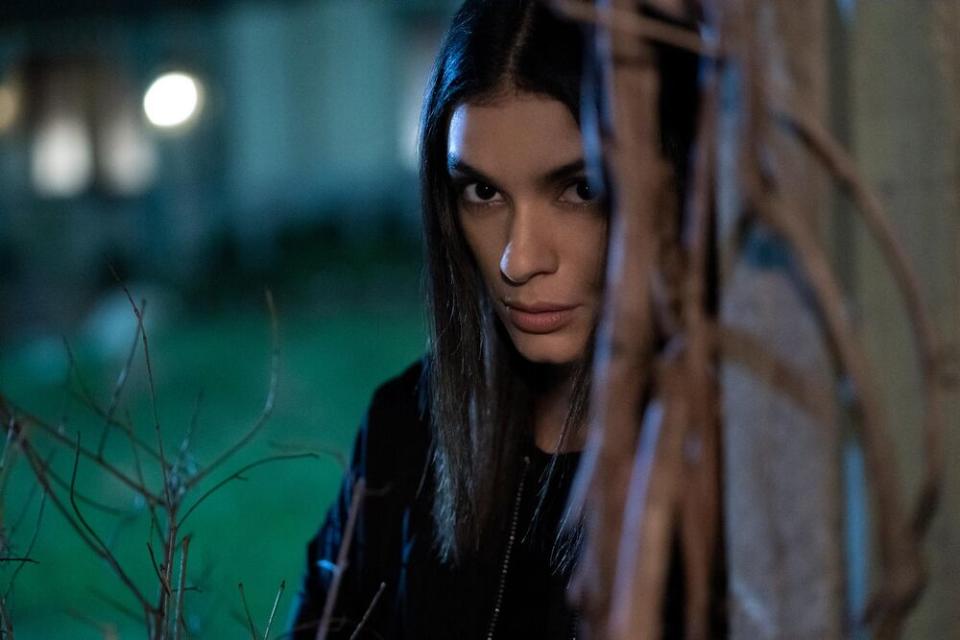Locke & Key showrunner Carlton Cuse teases long-awaited Netflix fantasy series
“It’s been a long and winding road,” showrunner Carlton Cuse (Lost, The Strain) says of Locke & Key’s journey to Netflix after a few years in development at other studios like Hulu. Originally a comic written by Joe Hill and illustrated by Gabriel Rodriguez, Locke & Key is the story of the Locke family, who move across the U.S. to their ancestral New England home in the wake of their father’s murder. They’re looking for a safe space to grieve and recover, but what they find is a mansion filled with magical keys: One can open any door anywhere, while another can unlock someone’s very mind. But even as Tyler (Connor Jessup), Kinsey (Emilia Jones), and Bode (Jackson Robert Scott) experiment with the different keys’ powers, they have to learn that with great power comes great responsibility. Someone else is after the keys, a demon named Dodge (Laysla De Oliveira), and whatever she wants with them can’t be good.
Ahead of Locke & Key‘s Netflix premiere on Feb. 7, EW caught up with Cuse to discuss the process of adapting the comic to the screen, creating magical keys, and balancing all the different story elements. Check that interview out below, read our review here, and stay tuned for more Locke & Key coverage.
ENTERTAINMENT WEEKLY: The show has been in development for years now. I’ve been a fan of the comics from way back, and I often recommend them to people who want to check out comics but don’t know where to start. What has your journey been like from the moment you became involved in Locke & Key to now, when it’s about to hit Netflix?
CARLTON CUSE: It’s been a long and winding road. There were a number of other writers and producers who were on the road before me. The development of this goes back to when Joe wrote the comic in 2008, but I picked it up a few years ago. I was also always a fan of the comic, and fortunate that the property had reverted to Joe and he wanted to work on it with me. We shot the pilot and started another journey that took us through a couple different companies. It’s one of these things where, it just was a hard thing to get the cocktail exactly right. There are a lot of things that are going on narratively in the story, and finding the right tone and narrative balance took awhile. I have to say, it was great when, at the end of a long journey, we ended up at Netflix. My co-showrunner Meredith Averill and I felt like we really had very connected visions with Netflix executives about where the show should go and what it should be. Creativity isn’t a sudden burst thing, it’s a continual process. I think all the twists and turns helped us get to a better place with show, to a place where we’re really proud of what it is: A reflection of Joe’s comic and an extension of the comic. That creative process is something we’ve done in conjunction with Joe and Gabe, and they’re very excited about it. Sometimes the most valuable things are hard to achieve. I feel like all the work and effort went into this was ultimately for the good of the show.
One thing I think you guys particularly nailed was the casting. Bode especially — you writers and the actor Jackson Robert Scott totally capture Bode’s vibe. It’s interesting looking back at the Locke & Key comics, because Rodriguez draws such unique, expressive faces. What were you guys looking for with casting?
The characters drawn by Gabe were an inspiration, but really a jumping-off point. We wanted to find actors who we felt were truthful to the emotional core of the characters. If you do your job as a writer and you put the character down on the page in a way you feel confident/excited about, the universe tends to deliver up the right people for you. That’s been my experience. We were really lucky. I feel like Conor Jessup and Emilia Jones and Jackson Scott, the three kids in particular, were all kind of perfect for the show. The Tyler character is a little different from the character in the comic, but the other two are very close. It felt like the evolution of Tyler was good for the show, he’s a little more soulful and kind of emotional than the character in the comics, but it worked really well. We got really lucky and found these great actors. I think Emilia is gonna be a big star. Jackson is actually the one significant actor who was in the previous version we did for Hulu and this one because he’s so good. He was also Georgie in It, so he’s already done something iconic with his yellow rain-slicker and red balloon. We wrote the characters we wanted to see, and the universe delivered the right actors.

The kids are the focus of the story, but the magic keys must also have been at the forefront of your mind going in. What keys were you looking forward to adapting, and what did you like about adding a few new ones?
The Matchstick Key was one we loved, because we knew it would be so visceral on screen. The idea of this key that could spontaneously ignite anything. That’s the first key you see right out of the box in the show. Personally I’m a big fan of the Ghost Key. That would be an awesome fantasy, to turn into a ghost and fly around. And then the Anywhere Key is something else that we loved, the idea that you can use this key in a door and take you through any door you’ve seen, even if it’s in a picture.
One of the reasons I love the story so much is there have been a million haunted house shows, and they start to feel derivative of each other. Joe Hill’s great accomplishment with Locke & Key was to create something really original in this space that felt fresh and different. It’s not a traditional haunted house show, it’s not a remix of Harry Potter, it’s its own thing. It uses elements we have come to love in a lot of other stories, but presents them in wholly fresh and new ways. That was what was really exciting about it. I remember when I was reading the comics, thinking ‘wow this is new and different, not something we’ve seen before.’ All along the way through this process, that’s something else that really motivated me to get this to the screen.
In the comics, Dodge famously used a Gender Key to disguise herself around the kids. How did you guys approach that key and Dodge’s use of it?
In the show it’s called the Identity Key. For us, in our adaptation, this was a key that allowed you to change your identity. You can’t change into an existing person, but you can change into any person that you imagine. Dodge uses this to assume different personas that will have the maximum psychological effect on who she’s manipulating. Dodge is a demon, and her base form is as this very beautiful woman. But she will change her identity to accomplish what she wants.

You guys do a good job of incorporating texting and social media. This show is a lot of different things, but it has a lot of scenes set in high school, and high school now seems suffused with smartphones even more than it was a few years ago when the comics came out. How did you guys think about incorporate that into the show visually?
One of the big creative challenges in the show was balancing all the elements. The patriarch of the family was murdered and there’s the mystery of what exactly happened and why. Then there’s a story about the family relocating to a new town and all the teen drama that ensues, then there’s the relationships between the brothers and sister, then there’s their relationship with magic. There’s a lot of different things going on. In terms of the texting, what Meredith and I wanted to do was make all the teen stuff feel real and authentic. Having shots of texts on phones didn’t feel like it had enough immediacy. We aren’t the first people by any means to put texting on screen, they were doing that in House of Cards. But it was something we wanted to feel visceral and immediate. Just as you were saying, it’s such a foundational communication process for kids that we wanted to make sure it felt like that in the way we were visually representing it.
References to the Chronicles of Narnia come up a couple of times. That made me curious: Even though the genius of Locke & Key is how original it is, what references were in your guys’ heads as you were working on this?
The Narnia series is probably the most important fantasy series that I read as a kid. It’s so foundational to me that in the Lost writer’s room there used to be a bell on the writers’ desk, and anytime I would bring up Narnia someone would ring the bell. It’s always been a huge influence on me, and I think on Joe Hill as well. I think in some ways we’re honoring C.S. Lewis, who really forged the path in this genre of literature that was inspirational to tons and tons of people.
What are you looking forward to people seeing from the show?
There’s a lot of really profound, heavy stuff on television. I think it’s been hard to find lighter fantasy fare that’s worked as well on television. We’re able to deliver an experience where I think people who loved Harry Potter will love the show. It’s a really fun, enjoyable, addictive watch. There’s nice moralism with the keys: With great power comes great responsibility.
Related content:

